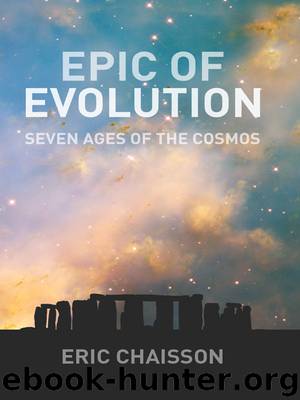Epic of Evolution by Chaisson Eric; Chaisson Lola Judith ;

Author:Chaisson, Eric; Chaisson, Lola Judith ;
Language: eng
Format: epub
Tags: Science/Life Sciences/Evolution
Publisher: Columbia University Press
Published: 2011-10-31T16:00:00+00:00
We stand to learn much about Earth’s evolution by comparing its properties to those of some of the other Terrestrial Planets. The interdisciplinary subject of comparative planetology has recently come into its own—the study of the broad and contrasting properties among the diverse worlds in our solar neighborhood. What makes Earth so different from the other planets? How is it that our home alone has blue skies, liquid water, and a gentle climate? And why is Earth the only world in the Solar System (as far as we know) that is an abode for life?
Consider the land, for instance. The high-standing continents on Earth, set slightly above the sea, owe their existence to the long history of plate-tectonic activity—activity probably absent on any other nearby planet. We take the land for granted, of course, for that’s where humans live. We even tend to focus on the land areas in those magnificent photos taken by astronauts of a distant Earth in space. But most of Earth is covered by water; a typical view from our planet’s surface would show exclusively water in all directions—which may be why the astronauts call Earth, when looking back from orbit, “the big blue marble.” In fact, the conditions needed to form the continents on Earth may be unmatched anywhere else in the Solar System. Those conditions led to active tectonics, the sign of a geologically lively planet, and life on the dry land is the beneficiary of it.
By contrast, Venus has recently expired, geologically speaking. Its closer proximity to the Sun might have shut down plate tectonics early, assuming it ever really got going. A difference of a few tens of millions of kilometers in the two planets’ distances from the Sun might have been enough to turn Earth’s nearest relative into a remote cousin. Extra solar heating seems to have thoroughly dehydrated Venus—its surface temperature today is a torrid five hundred degrees Celsius, nearly enough to melt lead—making its crust and upper mantle too dry and especially too buoyant to sink back down into its interior. The great up-welling of lava, outgassing of chemicals, and jostling of crust that accompany tectonics on Earth probably never much affected the Venusian surface. Robotic radar observations of this totally enshrouded planet, especially those made by the Magellan spacecraft in the 1990s, show little evidence for recent faulting, ridges, or volcanism (though ancient, now dormant volcanoes are visible). Surface features comparable to Earth’s continents, such as the highland landmasses Ishtar and Aphrodite Terra, have apparently not wandered around much, if at all. Parched Venus seems to have been inactive for the past half-billion years or so (as dry rock is stronger than water-bearing rock) and to have encased itself in a single, thick shell—yet a shell that probably preserves a record of its last attempt at crustal deformation, such as that which produced its most dramatic topographic feature, the Maxwell Montes mountain chain, which exceeds the height of Mount Everest on Earth. Planetologists surmise that Venus, being slightly smaller, is aging more quickly than Earth, and as such its recent past may portend our future.
Download
This site does not store any files on its server. We only index and link to content provided by other sites. Please contact the content providers to delete copyright contents if any and email us, we'll remove relevant links or contents immediately.
Sapiens: A Brief History of Humankind by Yuval Noah Harari(13951)
Sapiens by Yuval Noah Harari(5101)
Homo Deus: A Brief History of Tomorrow by Yuval Noah Harari(4666)
Pale Blue Dot by Carl Sagan(4594)
Livewired by David Eagleman(3522)
Origin Story: A Big History of Everything by David Christian(3460)
Brief Answers to the Big Questions by Stephen Hawking(3228)
Inferior by Angela Saini(3138)
Origin Story by David Christian(2976)
The Gene: An Intimate History by Siddhartha Mukherjee(2909)
Signature in the Cell: DNA and the Evidence for Intelligent Design by Stephen C. Meyer(2869)
The Evolution of Beauty by Richard O. Prum(2857)
Aliens by Jim Al-Khalili(2690)
How The Mind Works by Steven Pinker(2601)
A Short History of Nearly Everything by Bryson Bill(2496)
Sex at Dawn: The Prehistoric Origins of Modern Sexuality by Ryan Christopher(2401)
From Bacteria to Bach and Back by Daniel C. Dennett(2384)
Endless Forms Most Beautiful by Sean B. Carroll(2340)
Who We Are and How We Got Here by David Reich(2336)
